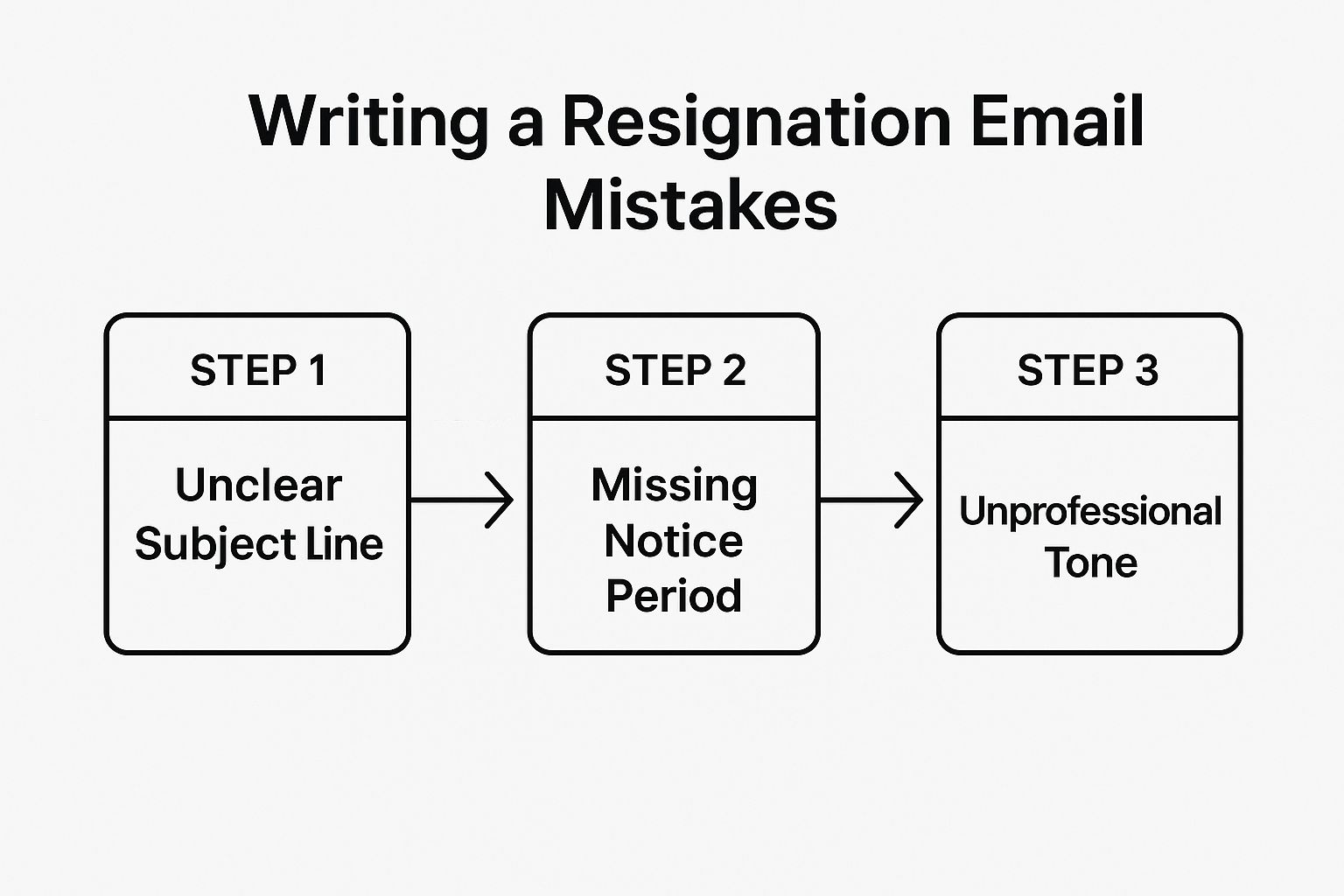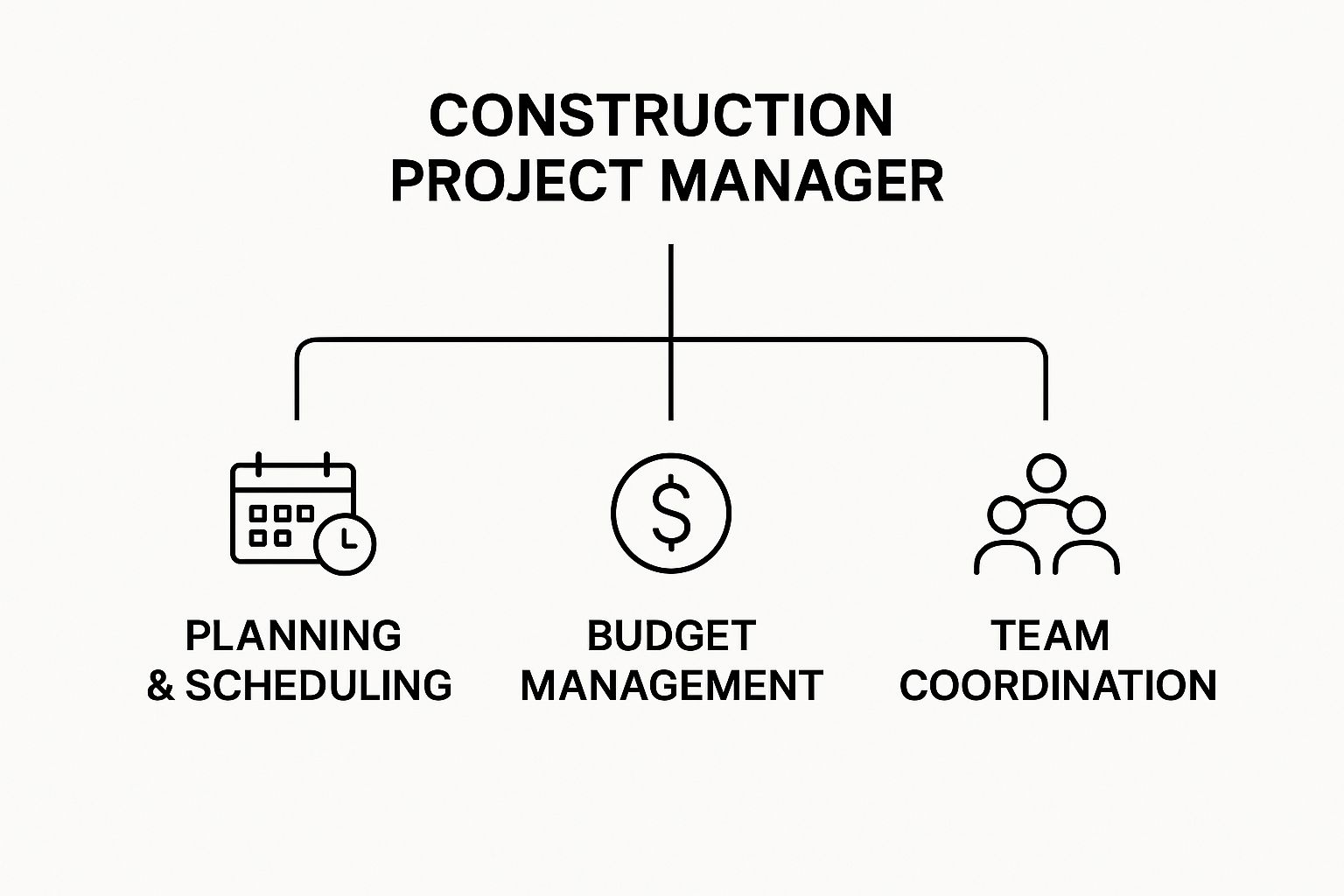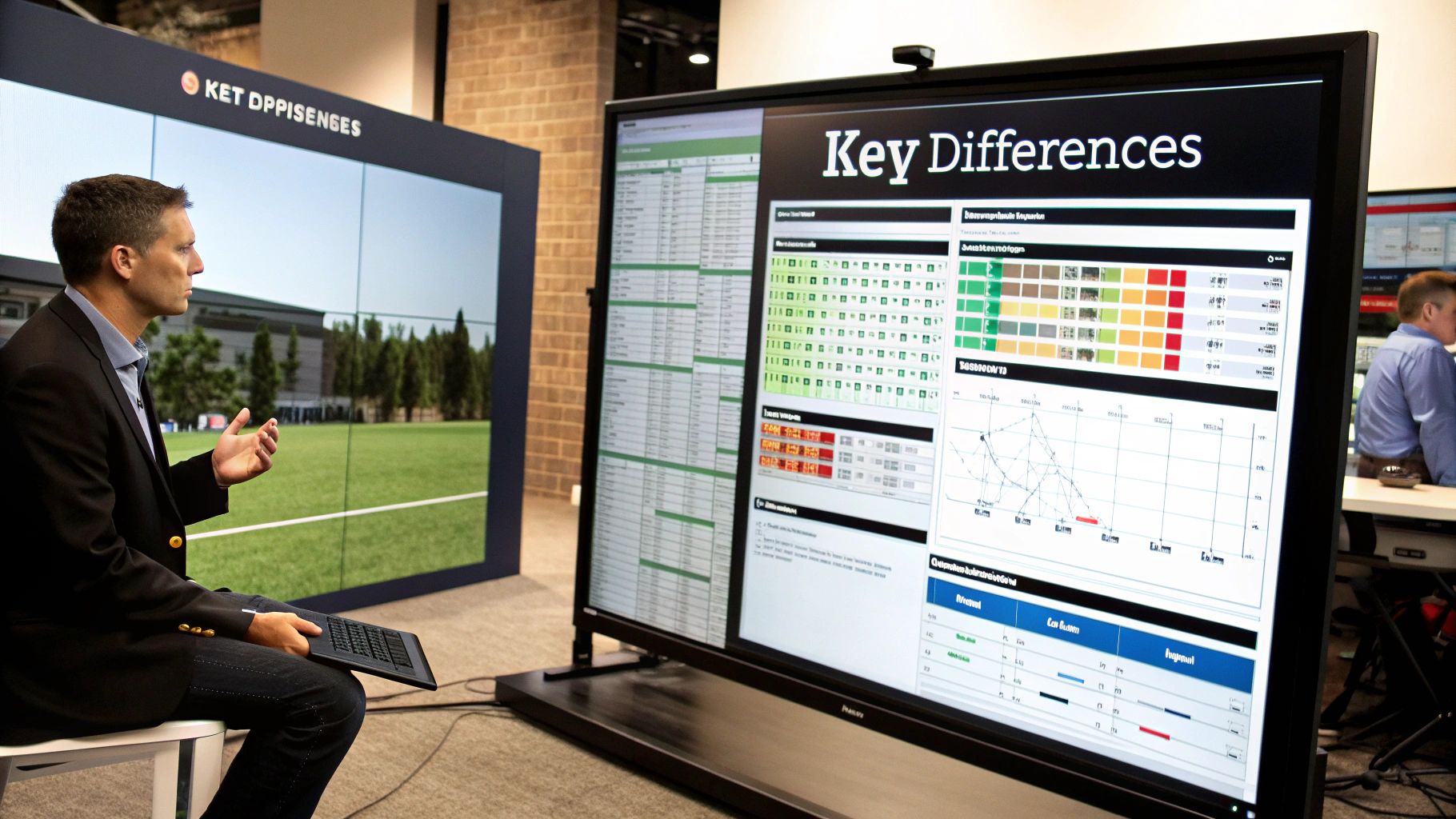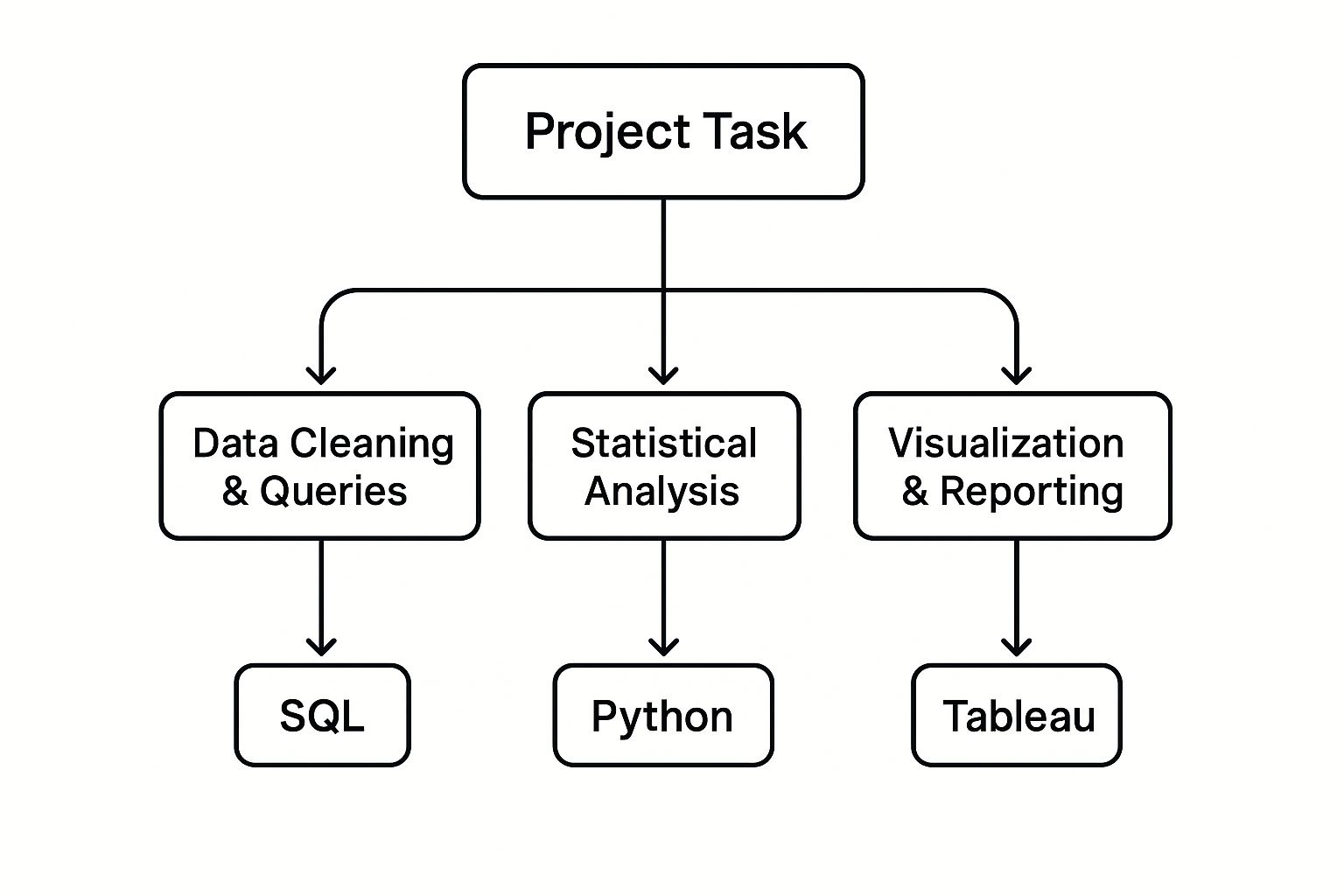So, you have decided to move on. While telling your boss in person is the correct first step, your formal resignation email is just as crucial. It is more than a simple goodbye—it is a legal document that confirms your departure date, initiates your notice period, and creates an official paper trail for everyone involved.
Think of it as the final, professional handshake that ensures you leave on the best possible terms.
Why Your Resignation Email Carries So Much Weight
Leaving a job is a defining moment in your career, and how you handle it shapes your professional reputation long after you have left the building. The conversation with your manager is essential, of course, but the written email that follows is the real cornerstone of a graceful exit. This is not just a formality; it serves a critical dual purpose.
First and foremost, it is an official record. Your email formally confirms your intent to leave and sets a clear timeline, officially starting the clock on your notice period as laid out in your employment contract. This simple act prevents any confusion about your last day and gets everyone on the same page.
It Is All About Protecting Your Professional Reputation
Beyond the paperwork, your resignation email is your final impression. In today’s interconnected world, your reputation is gold. The way you resign can directly impact future job references and networking opportunities down the line. A positive, professional, and thoughtful message reinforces all the goodwill you have built.
Your final act at a company is often the one people remember most. A well-written resignation email ensures that memory is one of professionalism and respect, leaving the door open for the future.
This is not just about being polite; it is a strategic move. In the UK job market, where a strong professional network is non-negotiable, a graceful exit is paramount. It is no surprise that recent surveys found a significant majority of UK employees believe the tone of their resignation directly impacts their future career prospects. If you want to dive deeper, you can discover more about Australian resignation letter best practices.
Ultimately, taking the time to write an excellent resignation email is an investment in your own future. It makes sure your departure is remembered for its class, not for being clumsy or abrupt.
The Core Components of a Resignation Email

To make sure your resignation email hits the mark, it needs to include a few non-negotiable elements. Think of it less as a long, heartfelt letter and more like a concise, formal notification. Your goal is to cover all the necessary bases and leave zero room for confusion.
Each part of the email has a specific job, from providing legal clarity to preserving professional relationships. Getting these details right from the outset is the key to a smooth and respectful exit.
A Clear and Direct Subject Line
First things first, your email subject line needs to be impossible to misinterpret. Any hint of ambiguity could see your important message get lost in a crowded inbox. Keep it direct, professional, and straight to the point.
A few solid options include:
- Resignation – [Your Name]
- Notice of Resignation – [Your Name]
- [Your Name] – Resignation
This kind of clarity ensures your manager and HR immediately grasp the email's purpose.
The Essential Details
Your email must clearly state your intention to resign and, most importantly, provide your final day of employment. Calculate this date based on the notice period outlined in your employment contract. For example, you might write, "My last day of employment will be Friday, 28th March 2025."
A resignation letter email is a critical formal document. It needs to clearly state your intention to leave, specify the effective date, and adhere to contractual terms like your notice period. For a more detailed walkthrough, you can explore our complete guide on how to write a resignation letter.
A professional resignation email should always include a brief offer to help with the transition. A simple sentence like, "I am committed to ensuring a smooth handover of my responsibilities before my departure," goes a long way in showing professionalism and goodwill.
Finally, while it is not always required, including your personal email address and phone number is a considerate touch. It signals that you are open to being contacted for urgent handover questions after you have left, reinforcing your commitment to a seamless transition for everyone involved.
Anatomy of a Professional Resignation Email
To help you get it right every time, here is a quick-reference table that breaks down the essential parts of your resignation email.
| Component | Why It's Essential | Example Phrasing |
|---|---|---|
| Clear Subject Line | Ensures the email is opened and understood immediately. | "Resignation – [Your Name]" |
| Statement of Resignation | Formally and clearly states your intent to leave. | "Please accept this email as formal notification of my resignation from my position as [Your Job Title]." |
| Last Day of Employment | Provides a specific, legally binding end date. | "My final day of employment will be [Date], in line with my notice period." |
| Offer to Assist | Shows professionalism and a commitment to a smooth handover. | "I am dedicated to ensuring a seamless transition and am happy to assist in training my replacement." |
| Expression of Gratitude | Maintains a positive relationship and leaves a good impression. | "Thank you for the opportunity to have worked at [Company Name]." |
| Professional Closing | Ends the email on a formal and respectful note. | "Yours sincerely," or "Kind regards," |
| Contact Information | (Optional) A considerate touch for post-departure questions. | "You can reach me at [Personal Email] or [Phone Number] for urgent handover queries." |
Following this structure helps you create a document that is professional, comprehensive, and leaves no room for misunderstandings.
Striking the Right Tone in Your Message

While the core message of your resignation email is simple, the tone you strike is absolutely everything. How you say goodbye can define how you are remembered long after you have left, shaping your professional reputation in the process.
Your goal should always be to sound gracious, positive, and diplomatic. Think of this email as your final professional act with the company—it needs to reflect the same care you would show in a client meeting or a high-stakes project.
Keep It Positive and Forward-Looking
This is not the time or place to air grievances or offer a detailed critique of your role, colleagues, or the company. Venting in your official resignation notice is a surefire way to burn bridges and will almost certainly make the handover period awkward for everyone involved.
Instead, keep your attitude constructive and forward-looking. The real aim here is to preserve goodwill and ensure you leave on the best possible terms. If you want to make sure your email is clear and professional, it is worth reviewing some effective business email writing tips.
A key principle I always tell people is to focus on gratitude, not grievances. Even if your experience was challenging, there is always something to be thankful for—a skill you learned, a project you enjoyed, or a supportive teammate.
For instance, expressing sincere thanks for the opportunity is crucial. A simple, genuine line carries significant weight and shows a level of maturity that managers remember.
- "I am very grateful for the opportunities I have been given during my time at [Company Name]."
- "Thank you for the support and guidance I have received over the past three years."
This positive framing is not about being disingenuous; it is about being strategic. Your resignation letter is a permanent record, and keeping it diplomatic ensures it reflects well on you, helping secure positive future references and preserving valuable network connections for years to come.
Resignation Email Templates for Any Situation
Knowing the theory is one thing, but having a solid starting point can make all the difference. To help you draft a polished and professional message, I have put together a few adaptable templates designed for different real-world scenarios.
Think of these as foundations, not fill-in-the-blank forms. The best resignation letter email is one that reflects your genuine experience and maintains a respectful tone. You absolutely should personalise them to fit your specific situation.
The Standard Professional Resignation Email
This is your all-purpose, go-to option. It is perfect for most situations where you need to be formal, positive, and direct. It covers all the essential components without getting overly emotional or bogged down in detail.
Example Template:
Subject: Resignation – [Your Name]
Dear [Manager's Name],
Please accept this email as formal notification that I am resigning from my position as [Your Job Title] at [Company Name].
In accordance with my notice period, my final day of employment will be [Your Last Day].
I am grateful for the opportunity to have worked here for the past [Number] years. I have genuinely enjoyed my time at [Company Name] and appreciate the support and opportunities you have provided me.
I am committed to ensuring a smooth handover during this transition. Please let me know how I can best assist in the coming weeks.
I wish you and the company all the best for the future.
Kind regards,
[Your Name]
The Positive Experience Resignation Email
Use this template when you have had a genuinely fantastic time at a company and want to express sincere, specific gratitude. It is slightly warmer but remains completely professional, helping you strengthen that positive relationship as you depart.
Example Template:
Subject: Notice of Resignation – [Your Name]
Dear [Manager's Name],
Please accept this message as notification of my resignation from the role of [Your Job Title] at [Company Name], effective two weeks from today. My last day will be [Your Last Day].
I want to express my deepest gratitude for the incredible opportunity I have had here. I am especially thankful for your mentorship on the [Specific Project or Skill] and the chance to collaborate with such a talented team. It has been a rewarding experience.
Of course, I will do everything possible to wrap up my duties and ensure a smooth transition for my successor.
Thank you again for everything. I look forward to staying in touch.
Yours sincerely,
[Your Name]
Expert Tip: Notice how the positive example includes a specific detail. Mentioning a project, a skill you learned, or a particular piece of guidance makes your gratitude feel far more authentic than a generic platitude. This small personal touch can leave a powerful, lasting impression.
Modern tools have certainly changed how people approach this task. In fact, a recent UK survey showed that a significant percentage of workers have used AI tools or online templates to craft their resignation notices, particularly among younger demographics.
If you want to explore various structures and ensure your message aligns with industry standards, it can be helpful to review general professional email templates for additional guidance.
Your Checklist Before and After Hitting Send
So, you have drafted the email. But clicking 'send' on your resignation is not the final move—it is just one step in a much bigger process. A truly smooth and professional exit takes careful planning, both before the email lands in your manager's inbox and long after.
First things first: the single most important action you can take happens before you send anything. You need to have a conversation with your manager. Firing off a resignation email out of the blue is simply poor form and can come across as cold or even disrespectful.
Book a private meeting, tell them your decision directly and respectfully, and let them know a formal email will follow. This one act of courtesy makes a world of difference and sets the right tone for your departure.
This infographic highlights some of the common pitfalls people fall into, which can easily undermine an otherwise professional exit.

As you can see, simple mistakes like a vague subject line, getting your notice period wrong, or letting an unprofessional tone slip through can damage the positive, lasting impression you want to leave behind.
What Comes After You Send the Email
Once the email is officially sent, your focus needs to pivot to managing your departure with grace. Be prepared for a range of reactions, from understanding and support to disappointment. You might even be presented with a counter-offer, which is a situation that requires very careful thought. If that happens, it is worth understanding the truth about counter-offers and what you need to know.
During your notice period, your main responsibilities are all about a smooth transition. This includes:
- Creating a Handover Document: Put together a clear, comprehensive guide covering your key tasks, ongoing projects, and important contacts. Make it easy for your replacement to pick things up.
- Navigating the Exit Interview: This is your chance to offer constructive, professional feedback. Focus on being helpful, not airing grievances.
- Saying Farewell to Colleagues: Keep your goodbyes positive. Thank your teammates and avoid causing any disruption in the workplace.
Your final weeks are a direct reflection of your overall professionalism. A meticulous handover and a positive attitude ensure you are remembered as a valuable, respectful team member, which goes a long way in safeguarding your professional reputation for years to come.
Common Questions About Resigning by Email

Even with the best intentions, navigating the finer points of resigning can bring up some tricky questions. Getting clear, straightforward answers is key to handling your departure with the confidence and professionalism it deserves. Here are some of the most common queries we see.
Is It Always Acceptable to Resign via Email?
Yes, in the UK, resigning by email is a standard and professionally accepted practice. It provides a formal, time-stamped record for both you and the HR department, which is essential for official purposes.
That said, an email should never be the first your manager hears of your departure. It should always follow a direct, face-to-face (or video call) conversation as a professional courtesy.
What if I Need to Resign with Immediate Effect?
Resigning without providing any notice is a serious step. It is typically reserved for exceptional circumstances, such as a significant breach of your employment contract by the company.
If you find yourself in this situation, your email should be very brief and to the point, clearly stating your resignation is effective immediately. Be aware that this can have serious contractual and financial implications, so it is always wise to seek legal advice before you hit send.
A resignation email should be a record of a conversation, not the conversation itself. The human element of speaking with your manager first is crucial for maintaining relationships.
Who Should I Send the Resignation Email To?
Your resignation email should go directly to your immediate manager. It is also best practice to CC (Carbon Copy) the Human Resources department.
This simple step ensures your notice is officially logged and that all the right people are informed at the same time, initiating the formal offboarding process.
Moving on to a new role involves more than just drafting the perfect email. It is a good idea to get across the hidden costs to consider when moving jobs or relocating to help you plan your transition smoothly.
At Redwolf Rosch, we are experts in connecting exceptional IT and Digital talent with leading organisations. If you are looking for a trusted, high-performing recruitment partner to navigate your next career move or find the perfect candidate, get in touch for an introductory discussion today at https://redwolfrosch.com.au.
 Submit CV
Submit CV Submit vacancy
Submit vacancy  Call for a Candidate
Call for a Candidate








Recent Comments